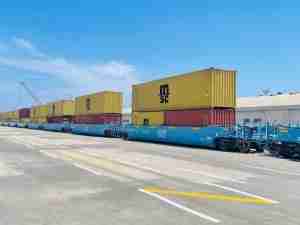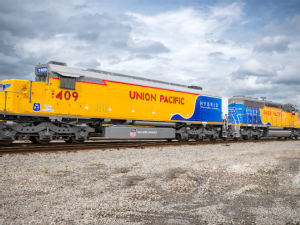Lobbying coalitions for hundreds of companies hope an improving economy will underscore the case that inefficiency associated with trucking capacity shortages and higher fuel expenses adds costs for shippers and consumers.
They are behind proposals taking shape in Congress to lift size restrictions. They also want to restore the flexibility of states to decide which trucks can operate on their roads.
Union and safety groups vocally oppose any change, saying bigger trucks would erode hard-won regulations and pose new hazards for truck drivers and other motorists just as U.S. traffic deaths are falling noticeably.
Also, smaller independent truckers say new size allowances would hurt their businesses by adding costs for equipment necessary to win business and compete with bigger rivals.
Randy Mullett, government relations vice president for trucking company Con-Way Inc , said business interests are working together on a range of changes in law that would affect regions and businesses differently.
"We don't want to run triples (trailers) through Washington, D.C., but we might want to in the cornfields of the Midwest," said Mullett, whose company is based in Michigan.
Mullett added the larger goal is to "find a way to make this part of the supply chain more efficient," especially with diesel fuel prices above $4 per gallon and other costs going up.
Shipping costs rose by almost 35 percent from 2004 through 2006, which translated into a 2 percent price increase for retail goods. A decrease during the subsequent economic downturn has been followed by an 8 percent shipping cost rise since 2009 due to capacity shortages, higher fuel prices and other factors, according to FTR Associates.
Highway Bill This Year
Lawmakers, the Obama administration and transportation and road safety interests anticipate a narrow window this spring to draft a bill on transportation infrastructure priorities.
Proposed trucking measures giving states authority to increase limits from 80,000 pounds to 97,000 pounds, extending trailer length and lifting some restrictions on interstate travel would most likely wind up in that legislation.
Bill Graves, chief executive of the American Trucking Associations trade group, said shipping interests are pushing hardest. He is confident legislation will include a related trucking proposal but it is too early to tell the outcome.
Noel Perry, an economist at FTR Associates, said the proposed changes would have a clear impact "from a supply chain standpoint."
Industries that ship the heaviest loads -- like agricultural products, paint and fuel, steel, and frozen foods -- are especially looking at spiraling cost increases through the early part of the decade, he said.
"Shippers are concerned for the first time in recent history about increasing costs. No one gets excited when costs go down. Now they're going up," Perry said.
More than a dozen states, several in the West, permit bigger trucks. But the rest do not, creating a patchwork of rules that business complains impedes seamless transport. Proponents say harmonizing rules in the West alone would cut truck miles by 25 percent and save fuel and road maintenance.
"Individual states are doing it in ways that have proven safe," said Peter Gatti, executive vice president of the National Industrial Transportation League, which represents 650 shippers.
But labor and safety groups have helped to hold the line on national weight and size limit changes over the years.
The Teamsters union, which represents more than 260,000 truckers at UPS Inc and YRC Worldwide Inc , fiercely opposes adding another trailer or axle and does not buy industry arguments that heavier loads would mean fewer trucks.
"Every time heavier trucks have been allowed, truck traffic increased because it becomes









